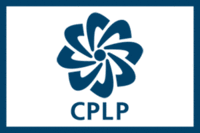Community of Portuguese Language Countries
The Community of Portuguese Language Countries (Portuguese: Comunidade dos Países de Língua Portuguesa; abbreviated as the CPLP), also known as the Lusophone Commonwealth (Comunidade Lusófona),[1][2] is an international organization and political association of Lusophone nations across four continents, where Portuguese is an official language. The CPLP operates as a privileged, multilateral forum for the mutual cooperation of the governments, economies, non-governmental organizations, and peoples of the Lusofonia.[3] The CPLP consists of 9 member states and 19 associate observers, located in Europe, the Americas, Asia, and Africa.
Comunidade dos Países de Língua Portuguesa Community of Portuguese Language Countries | |
|---|---|
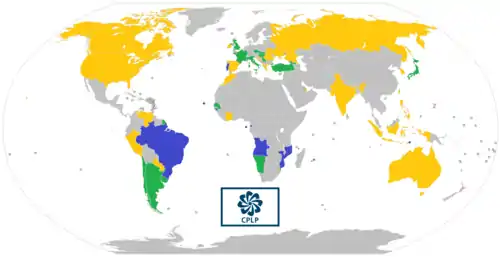 Map of CPLP member states (blue), associate observers (green), and officially-interested countries & territories (gold). | |
| Headquarters | Penafiel Palace Lisbon, Portugal 38°42.65′N 9°8.05′W |
| Official language | Portuguese |
| Membership | |
| Leaders | |
• Director-General | |
| Establishment | July 17, 1996 |
| Area | |
• Total | 10,743,526 km2 (4,148,099 sq mi) |
| Population | |
• Estimate | 270 million (2018) |
Website www | |
The history of the CPLP began when it was founded in 1996, in Lisbon, by Angola, Brazil, Cabo Verde, Guinea Bissau, Mozambique, Portugal, and São Tomé and Príncipe, nearly two decades after the beginning of the decolonization of the Portuguese Empire. Following the independence of Timor-Leste in 2002 and the application by Equatorial Guinea in 2014, both of those countries became members of the CPLP. Macau (a Special Administrative Region of China), Galicia (an Autonomous Community of Spain), and Uruguay are formally interested in full membership and another 17 countries across the world are formally interested in associate observer status.
History
.jpg.webp)
The idea of a type of international community or political union of Portuguese language countries had been proposed and studied numerous times in history. However, the idea for what would become the CPLP came about in 1983, during a state visit to Cabo Verde by Jaime Gama, Foreign Minister of Portugal, when he first proposed a biennial summit of heads of state and government of Lusophone countries of the world and the idea of regular meetings between ministerial counterparts of the member states.[4]
The Community of Portuguese Language Countries was officially founded on 17 July 1996 at the 1st CPLP Heads of State & Government Summit, in Lisbon, Portugal.
In 2005, during a meeting in Luanda, the ministers of culture of the member states declared the 5 May as the Lusophone Culture Day (Dia da Cultura Lusófona in Portuguese).[5]
Through successive enlargements, the Union has grown from the seven founding states—Angola, Brazil, Cape Verde, Guinea-Bissau, Mozambique, Portugal, and São Tomé and Príncipe—to the current nine, with the self-determination of Timor-Leste in 2002[6] and the accession of Equatorial Guinea in 2014[7] at the 10th CPLP Summit in Dili, Timor-Leste with the issuance of the Dili Declaration.[8]
The community has grown beyond its mission in fostering cultural ties between the Portuguese language countries into facilitating trade and political cooperation between the Lusophone countries of the world, with the CPLP is the fourth largest producer of oil in the world and its citizens totalling more than 270 million people.[9][10]
In 2017, in Brasilia, the nine member states agreed to enlarge cooperation in matters of the seas, tourism, economy and a more ambitious defense and cooperation mechanisms. More rights to the observer states was also approved, which Argentina planned to join.
Structure
.png.webp)
The CPLP's guidelines and priorities are established by a biannual Conference of Heads of State and Government (known as the CPLP Summits)[11] and the Organization's plan of action is approved by the Council of Foreign Ministers,[12] which meets every year. Special summits can requested at any time by 2/3 of the member states, usually for the purpose of pressing matters or incidents at the moment. There are also monthly meetings of the Permanent Steering Committee that follow specific initiatives and projects.
The headquarters of the CPLP is in Penafiel Palace in Lisbon, Portugal, but the organization maintains dedicated bureaus in all of the foreign ministries of the CPLP member states.
The CPLP is financed by its member states.[3]
Mission
CPLP is a multilateral forum created to deepen cultural, economic, and political cooperation among the Lusophone (Portuguese-speaking) nations of the world.[3] The prime objectives of the CPLP are:[3]
- Promotion and dissemination of the Portuguese language
- Political and diplomatic cooperation between the member states of the CPLP
- Cooperation in all areas, including education, health, science and technology, defense, agriculture, public administration, communications, justice, public safety, culture, sports and media
Executive Secretary
The Executive Secretary of the CPLP (Portuguese: Secretário Executivo da CPLP) is the executive head and highest representative of the CPLP. The Executive Secretary is charged with leading the Executive Secretariat (Secretariado Executivo), the CPLP's executive branch responsible for creating and implementing the CPLP's agenda of projects and initiatives.[13] The Executive Secretary, who must be a high-ranking diplomat or politician from one of the member states, is elected for a mandate of two years at the biennial CPLP Summit, and can be reelected once to a second term.[14] The Executive Secretariat is headquartered at Penafiel Palace in Lisbon, Portugal.
| # | Name | Portrait | Country | Start | End | Background |
|---|---|---|---|---|---|---|
| 1 | Marcolino José Carlos Moco | July 1996 | July 2000 | 3rd Prime Minister of Angola (1992–1996) | ||
| 2 | Dulce Maria Pereira | _(cropped).jpg.webp) |
July 2000 | August 2002 | President of the Fundação Cultural Palmares (1996–2000) | |
| 3 | João Augusto de Médicis | August 2002 | April 2004 | Brazilian Ambassador to Kenya (1984–1989) Brazilian Ambassador to Poland (1991–1993) Brazilian Ambassador to China (1994–1996) Brazilian Ambassador to Chile (1999–2002) | ||
| 4 | Luís de Matos Monteiro da Fonseca | July 2004 | July 2008 | Cabo Verdean Ambassador to European Community (1987–1991) Cabo Verdean Ambassador to Russia (1991–1994) Cabo Verdean Ambassador to Austria (1999–2001) Cabo Verdean Ambassador to the United Nations (2001–2004) | ||
| 5 | Domingos Simões Pereira | 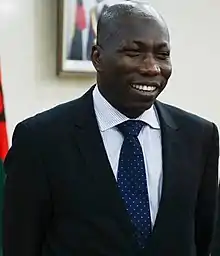 |
July 2008 | July 2012 | 16th Prime Minister of Guinea-Bissau (2014–2015) Guinea-Bissau Minister of Public Works (2004–2005) | |
| 6 | Murade Isaac Murargy | 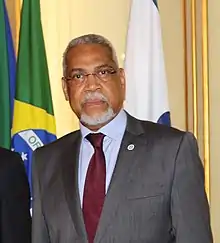 |
July 2012 | January 2017 | Secretary-General of the Presidency of Mozambique (1995–2005) Mozambican Ambassador to France and Germany (1985–1995) | |
| 7 | Maria do Carmo Trovoada Pires de Carvalho Silveira | 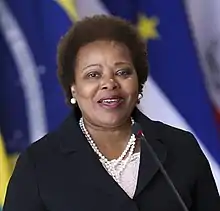 |
January 2017 | December 2018 | 13th Prime Minister of São Tomé and Príncipe (2005–2006) Governor of the São Toméan Central Bank (1999–2005, 2011–2016) | |
| 8 | Francisco Ribeiro Telles | .jpg.webp) |
December 2018 | Present | Portuguese Ambassador to Cabo Verde (2002–2006) Portuguese Ambassador to Angola (2007–2012) Portuguese Ambassador to Brazil (2012–2016) Portuguese Ambassador to Italy (2016–2018) |
Defense component
In 2016, CPLP revised its cooperation protocol in defense, affirming the organization in the promotion of peace and security.[15]
The 2017 Exercício Felino military exercise taking place in Academia Militar das Agulhas Negras, Resende, in the state of Rio de Janeiro, Brazil, aims for the increased interoperability of the armed forces of Angola, Brazil, Cape Verde, Equatorial Guinea, Guinea-Bissau, Mozambique, Portugal, São Tomé and Príncipe, and Timor-Leste. The first phase of the exercise, known as Carta (chart) took place in Cape Verde in 2016, in which the operation was planned and executed using computer networks as a war game. The Exercício Felino was established in the year 2000.[16][17]
Membership
Member states
_(cropped).jpg.webp)
There are nine full member states of the CPLP. Seven were founding members of the CPLP: Angola, Brazil, Cabo Verde, Guinea Bissau, Mozambique, Portugal, and São Tomé and Príncipe; Timor-Leste joined in 2002, after achieving independence and Equatorial Guinea joined in 2014.
Macau candidacy
Macau was the last Portuguese colony to be decolonized, and returned to China in 1999. It still retains traces of Lusophone culture and Portuguese is one of the official languages of the territory. Despite that, the majority of the population in Macau do not speak and understand Portuguese; rather, Cantonese is the main language. In 2006, during the II Ministerial meeting between China and Portuguese Speaking Countries, the CPLP Executive Secretary and Deputy ambassador Tadeu Soares invited the Chief Executive of the Government of the Macau Special Administrative Region, Edmund Ho, to request the Associate Observer status for Macau. The Government of Macau has not yet formalized this request.
Equatorial Guinea accession
When the CPLP was formed, Equatorial Guinea asked for observer status. Equatorial Guinea (Portuguese: Guiné Equatorial) was a Portuguese colony from the 15th to 18th centuries and has some territories where Portuguese-based creole languages are spoken and cultural connections with São Tomé and Príncipe and Portugal are felt. In the 21st century, the country has cooperated with Portuguese-speaking African countries and Brazil at an educational level. At the CPLP summit of July 2004, in São Tomé and Príncipe, the member states agreed to change the statutes of the community to accept states as associate observers. Equatorial Guinea then engaged in discussion for full membership.[18] In June 2010, Equatorial Guinea asked to be admitted as full member. At its eighth summit in Luanda in July 2010, the CPLP decided to open formal negotiations with Equatorial Guinea about full membership in the CPLP.[19] At its 10th summit in Dili in July 2014, Equatorial Guinea was admitted as CPLP member.[7]
Associate observers
_(cropped).jpg.webp)
In July 2006, during the Bissau summit, Equatorial Guinea and Mauritius were admitted as Associate Observers[20] along with 17 International associations and organizations considered as Consultative Observers. On 23 July 2014, Equatorial Guinea was admitted as a CPLP member.[7]
Mauritius, which was discovered by Portuguese explorers and maintains strong connections with Mozambique. In 2008, Senegal, with historical connections to Portuguese colonisation in Casamance, was admitted as Associate Observer.[20]
In July 2014, during the Dili summit, the Heads of State and Government approved a resolution that grants Georgia, Japan, Namibia and Turkey the status of Associate Observers.[7] Japan has had historical contacts with the Portuguese language in the 16th and 17th century, and today has connections to the Lusophone world through Japanese Brazilians in Brazil and Japan. Namibia has had extensive contact to the Lusophone world due to its location just south of Angola.
Three European nations, the Czech Republic, Hungary, and Slovakia, were admitted as observers along with Uruguay at the 2016 summit. Uruguay has historical ties to Brazil and Portugal and has some speakers of Portuñol, a Spanish–Portuguese pidgin. In January 2018 and prior to the 2018 summit, Italy requested the observer status as effort for the consolidation of bilateral relations with all of the Portuguese-speaking countries. In its request, the Italian government referred that due to the increasing number of associated observers in the community, CPLP is becoming a forum for countries in various geographical regions. Earlier in January, Andorra also formalized its candidacy for the same status.[21] Italy shares a legacy of Ancient Rome and Italy is the non-lusophone nation with the greatest number of university chairs in the Portuguese language. Because of immigration and geographic proximity, Portuguese is one of the most spoken languages in Andorra.[22]
In the 2018 summit with all the heads of state present, with the exception of East Timor due to national policies issues, several observers joined the organization: Luxembourg, Andorra, the United Kingdom, Argentina, Serbia, Chile, France, Italy and the Organization of Ibero-American States joined as observers.[23] Uruguay, an observer nation since 2016, admitted in early 2018 a candidacy to become full member of the CPLP.[24]
Consultative observers
The status of consultative observer is granted to organizations of civil society throughout the Lusofonia and pan-Lusophone bodies, as well as Lusophone institutions based outside of the Lusofonia, which serve a consultative status to the CPLP.[25]
| Country | Consultative observers |
|---|---|
| |
| |
| |
| |
| |
| |
| |
| |
| |
|
Scope
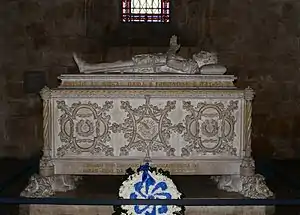
The Portuguese-speaking countries are home to 267 million people located across the globe but having a common language, a shared history, and some cultural similarities. The CPLP nations have a combined area of about 10,742,000 square kilometres (4,148,000 sq mi), which is more than twice as large as the European Union 4,475,757 square kilometres (1,728,099 sq mi), but with a little more than half of the population.
Political cooperation
Since its formation, the CPLP has helped to solve problems in São Tomé and Príncipe and in Guinea-Bissau, because of coups d'état in those countries. The CPLP helped these two countries to take economic reforms (in the case of São Tomé) and democratic ones (in the case of Guinea-Bissau).
In the early 21st century, the leaders of the CPLP believed that peace in Angola and Mozambique, as well as East Timor's independence, favored the development of the CPLP and a strengthening of multilateral cooperation.
Language
.jpg.webp)
Since many children in rural areas of Lusophone Africa and East Timor are out-of-school youth, the education officials in these regions seek help from Portugal and Brazil to increase the education to spread Portuguese fluency (like establishing Instituto Camões language center branches in main cities and rural towns), as Portuguese is becoming one of the main languages in Southern Africa, where it is also taught in Namibia and South Africa.
Angola has not yet signed the most recent accord on the orthography of the Portuguese language, and has asked other PALOP countries to support it in discussions on various points of that accord with Portugal.[26]
Education
In many developing Portuguese-speaking nations, Portuguese is the language of government and commerce which means that Portuguese-speaking people from African nations can work and communicate with others in different parts of the world, especially in Portugal and Brazil, where the economies are stronger. Many leaders of Portuguese-speaking nations in Africa are fearful that language standards do not meet the fluency required and are therefore making it compulsory in schools so that a higher degree of fluency is achieved and young Africans will be able to speak a world language that will help them later in life.
Lusophone Citizenship
Easing citizens' cross-border movement between the member states was proposed at the 2017 CPLP Summit.[27] This proposal by Portugal and Cape Verde to Brazil was thought by some to conflict with Europe's Schengen area. However, this free movement is based on a different model: as residence permits, associated with the recognition of academic degrees and professional qualification, and maintenance of social rights including pension systems. It would henceforth establish the Lusophone citizenship, the cidadania lusófona.[28]
Institutions
CPLP Summits
| Conference of Heads of State & Government of the CPLP CPLP Summit | |
|---|---|
 The 12th CPLP Summit; Cabo Verde, 2018. | |
| Host country | Rotates every two years between CPLP member states Most recent: |
| Website | Conferência de Chefes de Estado e de Governo da CPLP |
.jpg.webp)
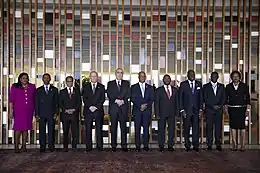
The Conference of Heads of State and Government of the CPLP (Portuguese: Conferência de Chefes de Estado e de Governo da Comunidade dos Países de Língua Portuguesa; CCEG), commonly known as the CPLP Summit (Cimeira da CPLP) is a biennial meeting of heads of state and heads of government of the member states of the CPLP. It is considered one of the fundamental pillars of the CPLP's structure.
- Objectives
The mission of the CPLP Summit is to:[29]
- Define and focus the CPLP's strategy and general policy
- Adopt and implement the agenda agreed upon by member states
- To create institutions of the CPLP or delegate powers to the CPLP Council of Ministers
- Elect a rotating presidency of the CPLP
- Elect the CPLP Executive Secretary
| Summit | Host country | Host city | Year |
|---|---|---|---|
| I | Lisbon | 1996 | |
| II | Praia | 1998 | |
| III | Maputo | 2000 | |
| IV | Brasília | 2002 | |
| V | São Tomé | 2004 | |
| VI | Bissau | 2006 | |
| VII | Lisbon | 2008 | |
| VIII | Luanda | 2010 | |
| IX | Maputo | 2012 | |
| X | Dili | 2014 | |
| XI | Brasília | 2016 | |
| XII | Ilha do Sal | 2018 |
Minister Meetings

CPLP Games
International Portuguese Language Institute
See also
- Flag of the Community of Portuguese Language Countries
- Geographic distribution of the Portuguese language
- List of countries where Portuguese is an official language
- List of international organisations which have Portuguese as an official language
- Portuguese-speaking African countries (PALOP)
- International Association of Portuguese-Speaking Communications
- Comunidade do Escutismo Lusófono
- Portuguese language in Africa
- Portuguese language in Asia
- Lusitanic
- Lusophone
- Lusophone music
- Lusophony Games
- CPLP Games
- Instituto Camões
- Portuguese Empire
References
- Rogers-Glabush, Julie (October 4, 2009). IBFD International Tax Glossary. IBFD. ISBN 9789087220570 – via Google Books.
- Africa South of the Sahara 2003. Psychology Press. October 31, 2002. ISBN 9781857431315 – via Google Books.
- "CPLP Objectivos" (in Portuguese). CPLP. Retrieved 23 July 2014.
- "CPLP - Comunidade dos Países de Língua Portuguesa - Histórico - Como surgiu?". www.cplp.org.
- "Declaração de Luanda – IV Reunião dos Ministros da Cultura da CPLP" (PDF) (in Portuguese). CPLP. 13 May 2005. Retrieved 23 July 2014.
- "DECLARAÇÃO SOBRE A ACEITAÇÃO DO PEDIDO DE ADESÃO DA REPÚBLICA DEMOCRÁTICA DE TIMOR-LESTE À CPLP" (PDF) (in Portuguese). CPLP. 1 August 2002. Retrieved 23 July 2014.
- "X Conferência de Chefes de Estado e de Governo da Comunidade dos Países de Língua Portuguesa" (in Portuguese). CPLP. 23 July 2014. Archived from the original on 26 July 2014. Retrieved 23 July 2014.
- "Angola: CPLP 10th Summit of Dili Ends". allAfrica.com. 2014-07-24. Retrieved 2015-08-11.
- "CPLP é o quarto maior produtor de petróleo do mundo" (in Portuguese). DW. 22 July 2014. Retrieved 15 December 2014.
- "António Vitorino diz que dimensão geopolítica explica adesão da Guiné Equatorial à CPLP" (in Portuguese). SIC Notícias. 23 July 2014. Retrieved 15 December 2014.
- "CPLP Conferência de Chefes de Estado e de Governo" (in Portuguese). CPLP. Retrieved 25 December 2018.
- "CPLP Conselho de Ministros" (in Portuguese). CPLP. Retrieved 23 July 2014.
- "CPLP Secretariado Executivo" (in Portuguese). CPLP. Retrieved 23 July 2014.
- "Estatuto". www.cplp.org.
- "CPLP: Ministros da Defesa aprovam criação mecanismos de resposta conjunta a situações de catástrofes" (in Portuguese). Expresso das Ilhas. 20 May 2016. Archived from the original on 21 May 2016. Retrieved 22 May 2016.
- "Incidentes em Cenário fictício comporão Exercício Felino, que prepara países da CPLP para emprego conjunto" (in Portuguese). Academia Militar das Agulhas negras. Retrieved September 22, 2017.
- "Militares de estados da CPLP preparam no Brasil exercício conjunto" (in Portuguese). África 21 Digital. Retrieved September 22, 2017.
- CPLP discusses Equatorial Guinea's membership – People's Daily Online. English.people.com.cn (2008-07-26). Retrieved on 2013-08-09.
- "Nota informativa: Missão da CPLP à Guiné Equatorial" (in Portuguese). CPLP. 3 May 2011. Retrieved 27 March 2012.
- "Observadores Associados" (in Portuguese). CPLP. Retrieved 23 July 2014.
- "Itália pede estatuto de observador na CPLP" (in Portuguese). DN. 29 January 2018. Retrieved 8 February 2018.
- "The World factbook – Andorra". CIA. Retrieved 8 February 2018.
- "Declaração da XII Conferência de Chefes de Estado e de Governo da CPLP". CPLP. Retrieved 24 July 2018.
- "Uruguai admite apresentar candidatura a Estado-membro da CPLP". Expresso. Retrieved 24 July 2018.
- Comunidade dos Países de Língua Portuguesa. "Lista completa dos Observadores Consultivos" (in Portuguese). Retrieved 20 February 2010.
- "PALOP reunem-se à margem da 20ª Cimeira do Conselho Executivo" [PALOP countries meet at the 20th summit of the UA executive] (in Portuguese). Angop. 28 January 2012. Retrieved 27 March 2012.
- "CPLP quer uma espécie de "vistos gold" para os nove" (in Portuguese). Publico. July 21, 2017. Retrieved July 23, 2017.
- "Governo diz que liberdade de circulação na CPLP não colide com Schengen" (in Portuguese). Publico. Retrieved July 23, 2017.
- "Conferência de Chefes de Estado e de Governo". www.cplp.org.
External links
| Wikimedia Commons has media related to Comunidade dos Países de Língua Portuguesa. |
- Official website

- UCCLA Union of the Capital Cities of Portuguese language
